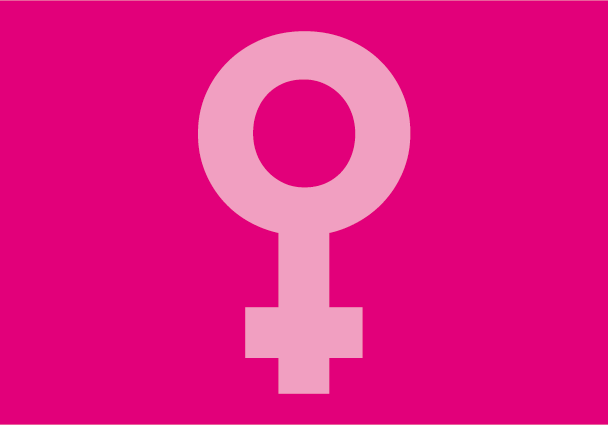
Feb 26, 2018 | Events
On 28 February 2018, the ICJ is holding a workshop on combatting sexual and gender-based violence (SGBV) in Swaziland, in cooperation with Women and Law in Southern African – Swaziland (WLSA Swaziland) and the Swaziland Action Group Against Abuse (SWAGAA).
The workshop, held as part of the ICJ’s Global Redress and Accountability Initiative, will consider the prevalence of SGBV in Swaziland, and contributing factors, and will focus on the extent to which perpetrators of such violence are, and can be, held accountable in law and in practice and the means by which victims of SGBV may better access effective remedies and reparation.
Participants will also discuss opportunities for engagement with UN mechanisms on addressing SGBV in the Kingdom of Swaziland.
The workshop is set against the backdrop of urgent recommendations adopted by the UN Human Rights Committee in 2017 on the combatting of violence against women, in respect of which Swaziland must report to the Committee by July 2018.
It comes ahead of Swaziland’s anticipated report, also due in July 2018, to the UN Committee on the Elimination of All Forms of Discrimination Against Women which in 2014 also adopted several recommendations on the combatting of violence against women.
The workshop also comes as national debates continue on the enactment of the Sexual Offences and Domestic Violence Bill, which Swaziland had committed to enact without delay at its 2016 Universal Periodic Review.
Workshop Agenda
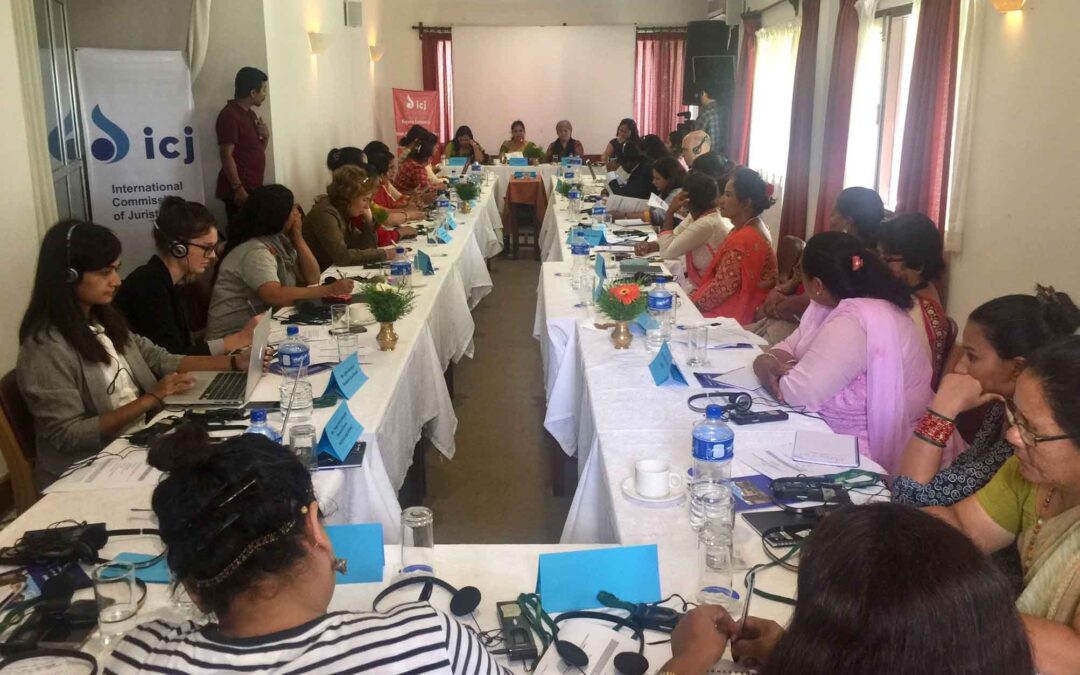
Feb 8, 2018
Today, the ICJ released a new briefing paper concerning its Regional Conference on Women Human Rights Defenders as Political Actors (28-29 August 2017), which brought together women human rights defenders (WHRDs) from all over Nepal who were elected in May 2017.
The conference focused on how newly-elected WHRDs could continue to advance human rights in their new roles as elected officials, with specific attention paid to encouraging equal participation of women in public affairs and furthering their advocacy for human rights.
The attached briefing paper lays out the key points of the conference and offers a set of future actions aimed at supporting WHRDs in their role as political actors pursuing a human rights agenda.
Nepal-WHRD-Advocacy-Analysis brief-2018-ENG (Briefing Paper in PDF)
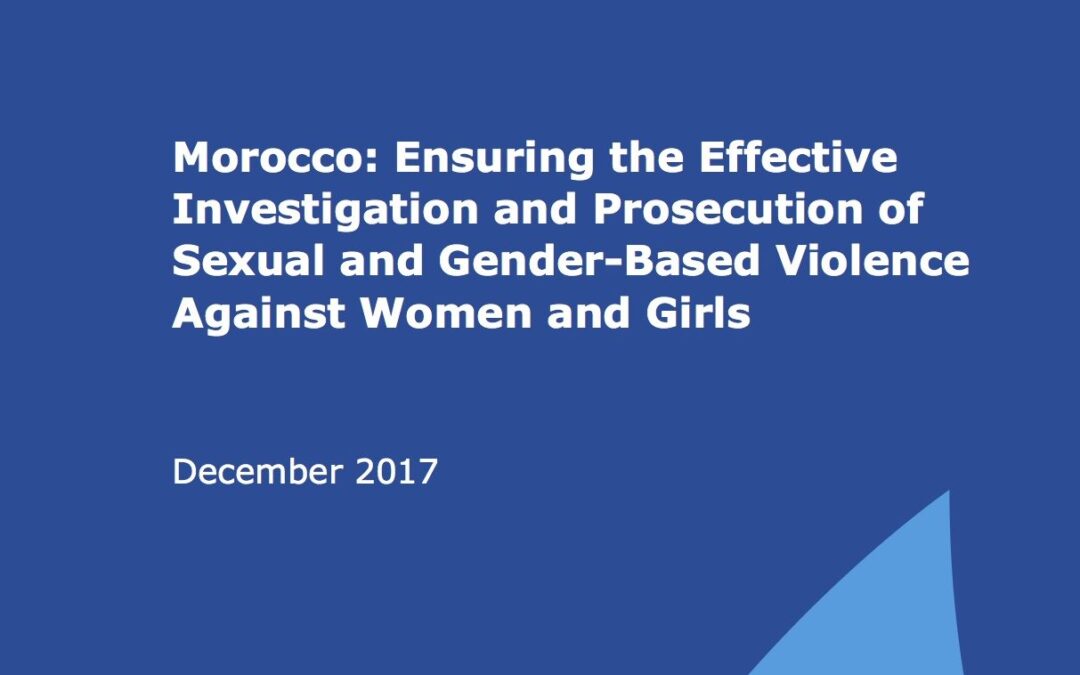
Dec 21, 2017 | News
The ICJ today called on the Moroccan authorities to effectively investigate and prosecute sexual and gender-based violence (SGBV) offences, including by ensuring the rights of victims to effective remedies and reparation and by combatting the impunity prevailing in Morocco over such offences.
The statement came following a high-level mission to Morocco from 18 to 21 December 2017 in which the ICJ launched its memorandum Morocco: ensuring the effective investigation and prosecution of sexual and gender-based violence against women and girls, and engaged with members of the government, the Parliament and the judiciary on the findings and recommendations of the memorandum.
Based on a review of 75 judgments handed down by Moroccan First Instance Tribunal and Courts of Appeal in cases involving SGBV offences, and on interviews with various actors in the justice system, the ICJ documented how the lack of guidelines on investigating and prosecuting SGBV, combined with the inadequacy of evidentiary rules and procedures, frustrate the successful prosecution of SGBV cases in Morocco.
Cases are often dismissed on grounds of insufficient evidence; and sentences, in those cases brought to trial, are often disproportionately lenient. This is partly due to the prevalence of judicial stereotyping, reduction of sentence when the defendant marries the victim (a practice that itself raises human rights concerns), and the arbitrary or unexplained application of mitigating circumstances such as the “social situation of the defendant” or “the relative seriousness of the acts that were committed”.
“Moroccan authorities should overhaul the framework and procedures on investigation and prosecution of SGBV,” said Saïd Benarbia, Director of the ICJ Middle East and North Africa Programme. “They should ensure effective and timely protective measures for the victims; provide for clear guidelines and protocols for law enforcement officers, prosecutors, doctors and other health professionals, and consolidate and supplement the victims’ testimony with additional evidence, in particular medico-legal and forensic evidence.”
“Those in charge of investigations and prosecutions must also minimize the burden on the victims with a view to avoiding their secondary victimization; refrain from stereotyping, victims’ blaming and other harmful practices that undermine the rights of the victims, and challenge, by way of appeal, disproportionately lenient sentences,” concluded Martine Comte, honorary judge and former President of the Court of Appeal of Orléans, France, who led the ICJ Mission.
Contact:
Saïd Benarbia, Director of the ICJ Middle East and North Africa Programme, t: +41.22.979.3817, e: said.benarbia(a)icj.org
Additional information
The mission was led by Martine Comte, honorary judge and former President of the Court of Appeal of Orléans, France, and included Saïd Benarbia, Director of the ICJ MENA programme, and Giulia Soldan, Programme Manager of the ICJ MENA programme.
The ICJ delegation met with Mr Mohamed Aujjar, Minister of Justice; Mr Adil El Bitar, President of the Commission on Justice, Legislation, and Human Rights at the Chamber of Deputies; Mr Mohamed Abdennabaoui, President of the Office of the Public Prosecutor and Prosecutor General of the Cassation Court; and representatives of civil society.
This Press Release is also available in Arabic (in PDF format), here: MOR Mission Dec PR ARABIC
The memorandum Morocco: ensuring the effective investigation and prosecution of sexual and gender-based violence against women and girls is available (PDF format):
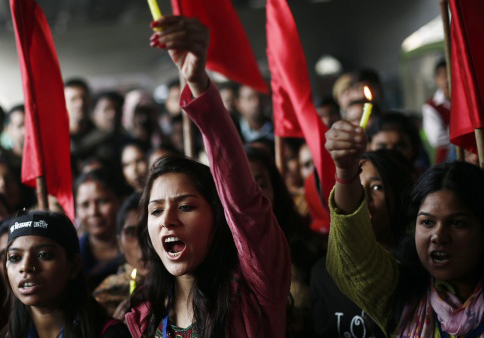
Nov 25, 2017 | Multimedia items, News, Video clips
Over the last year, since 25 November 2016, the ICJ has published a series of (video) profiles introducing the remarkable work of ICJ women Commissioners and Honorary Members.
“The ICJ has a strong focus on the struggle to eliminate violence against women. It is supporting the judiciary, independent civil society organizations and women’s rights defenders, in their work to promote international standards, ensure that victims are made visible and that States understand their responsibilities and obligations. At the same time, the ICJ provides much-needed judicial education on gender-based violence,” said Justice Radmila Dragicevic-Dicic, ICJ Commissioner, member of ICJ’s Executive Committee, and Justice of the Supreme Court of Serbia, on the occasion of 25 November, International Day for the Elimination of Violence against Women.
ICJ Commissioners have been at the forefront of the work to reform justice systems to make it easier for women to take cases of domestic violence to the courts, to punish perpetrators of rape and sexual assault as a war crime, to challenge discriminatory religious and family laws and to support victims of human trafficking and forced prostitution.
The ICJ has also supported judicial training programmes on access to justice for women. In 2016, the ICJ, in collaboration with UN Women, hosted a workshop for representatives from the judiciaries of Indonesia, Philippines, Timor Leste, and Thailand.
The participants of the workshop developed and adopted the Bangkok General Guidance for Judges in Applying a Gender Perspective.
In follow up, for example, the Supreme Court of Indonesia has now issued a Regulation based on the General Guidance, requiring judges to apply a gender perspective as they consider cases before them that involve women’s human rights.
Working in partnership with other organizations and the UN, the ICJ and its Commissioners will continue to work to ensure justice for women and to end gender-based violence.
The video interviews of ICJ women Commissioners and Honorary Members can be accessed here:
Justice Radmila Dragicevic-Dicic has worked on issues of organized crime and human trafficking. In the Serbian Constitution, human trafficking is now categorized as a crime against humanity and is taken very seriously. Radmila highlights the importance of ensuring the non-punishment, safety and protection of victims as well as their right to access compensation.
Prof Jenny Goldschmidt is a former President of the Equal Treatment Commission of the Netherlands and has combined academic research with practical work, with a particular focus on non-discrimination and the concepts of equality. She considers it is vital to take cases to the Treaty Bodies and courts everywhere to establish severe measures against discrimination and domestic violence.
Asma Jahangir is an Honorary Member of the ICJ, and the co-founder of Pakistan’s first all female law firm. She worked on a number of landmark cases including on issues such as whether women could get married without their father’s permission, be entitled to family maintenance or whether women should be judged according to religious law.
Imrana Jalal is a human rights lawyer and gender specialist in the Asian Development Bank in Manila. Imrana helped draft and negotiate the passage of the ground-breaking Fiji Family Law Act, which took twelve years to pass. She considers that in the area of family law, some progress has been made but it is hard because it is based on the premise that women have an equal right to property and this directly confronts social norms.
Hina Jilani is an advocate of the Supreme Court of Pakistan and served as the first UN Special Representative on Human Rights Defenders. She considers domestic violence in Pakistan as a major problem. Although the Pakistani judiciary is traditionally very conservative, Ms Jilani considers there has been progress because women’s rights advocates present cases in such a way as to make the social inequalities and injustices apparent.
Justice Sanji Monageng is a member of the International Criminal Court. She considers that the ICC has not done very well in prosecuting sexual and gender-based violence so far. The new Chief Prosecutor, Fatou Bensouda, has created a policy on sexual violence and gender issues, establishing a dedicated unit. She says is it evident in the cases that now come before her, there is a lot more attention being paid to sexual violence.
Karinna Moskalenko is a Russian lawyer and a founder of the International Protection Centre in the 1990s after Russia had ratified the Optional Protocol to the ICCPR. She explains her work to support women who are much more vulnerable than men, particularly because of the problem of domestic violence.
The former ICJ Vice-President Michèle Rivet was the first President of the Quebec Human Rights Tribunal from 1990 and until 2010. For Michèle, those who work in the field of human rights form a global village and have a duty to help women victims of violence: “we must all walk together on the long march to equality.”
Prof. Leila Zerrougui is Algerian and has served at the Algerian Supreme Court. She worked in the DRC as part of the UN Stabilization Mission and was Special Representative of the Secretary General for Children and Armed Conflict. In the DRC, she established mobile criminal justice system, with an investigator, prosecutor and a mobile court and prison in every Province. In this context, she explained how rewarding it was to see a colonel taken to the village where he and his soldiers had raped women to face justice there.
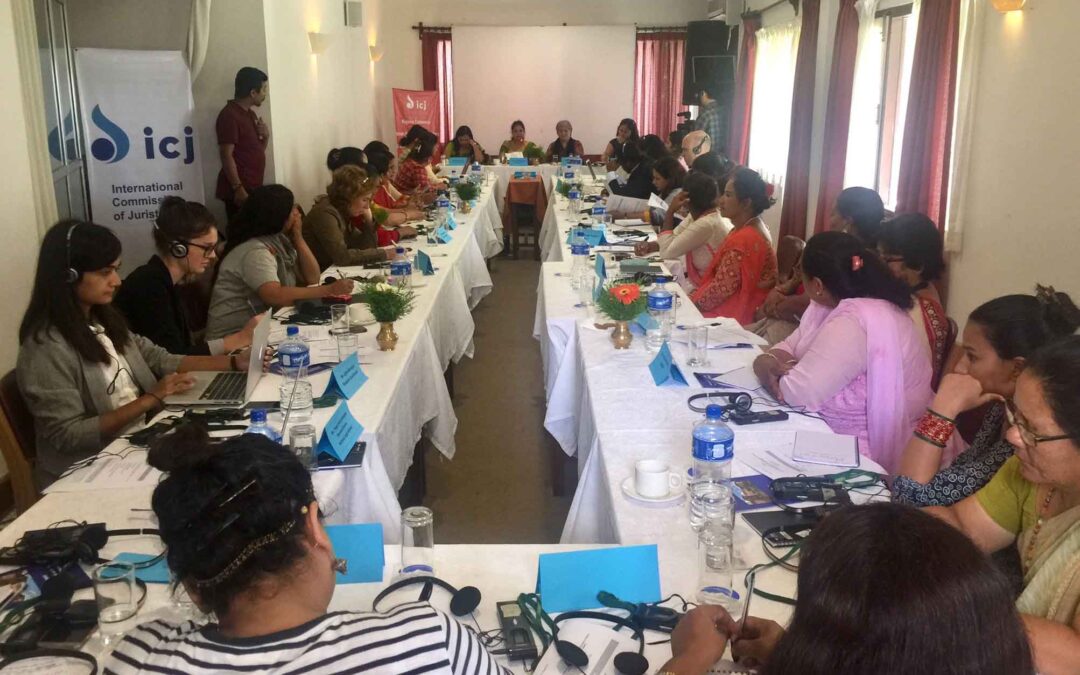
Aug 29, 2017 | News
Today, the ICJ concluded its Regional Conference on Women Human Rights Defenders as Political Actors, which gathered in Kathmandu women human rights defenders (WHRDs) from all over Nepal who were recently elected during the local elections in May 2017.
They were joined by Bushra Gohar, a former Member of Parliament in Pakistan, Ahmed Naaif of the Maldivian Democracy Network, and Sherene Xavier, a filmmaker and WHRD from Sri Lanka.
The discussions focused on how the newly-elected WHRDs can continue to advance human rights in their new roles as elected officials.
Under Nepal’s Local Level Election Act 2017, political parties are required to field female candidates for half of the executive posts (mayor/deputy mayor) and at least 40% for membership at the local community councils.
In May 2017, during the first local election held in the country in almost 20 years, approximately 20,000 women stood for elections, including WHRDs.
Most of the women candidates, however, were fielded by the political parties for the deputy mayor posts. At least 92% of the candidates fielded for the mayoral posts were men.
The discussions during the two-day conference (28-29 August 2017) focused on how these affirmative measures should be utilized by women human rights defenders in Nepal to advance equal participation of women in public affairs and further their advocacy for human rights.
There was some caution expressed by some of the women that these measures may reinforce the already disadvantaged place women hold in public life and may also be viewed as tokenism.
Participants in the conference discussed as well how as WHRDs, they would need to deal with human rights abuses allegedly committed by their political parties against women.
The need for WHRDs in politics to have their own support system was also emphasized during the conference.
The participants of the conference ran under the banner of various political parties in Nepal.
The National Alliance of Women Human Rights Defenders of Nepal collaborated with ICJ in organizing the conference.
The conference was opened with a keynote speech from Justice Sapana Pradhan Malla of the Supreme Court of Nepal, who spoke about the challenging path women politicians face.
Former Chief Justice Kalyan Shrestha, Commissioner of the ICJ, chaired the opening ceremonies.









